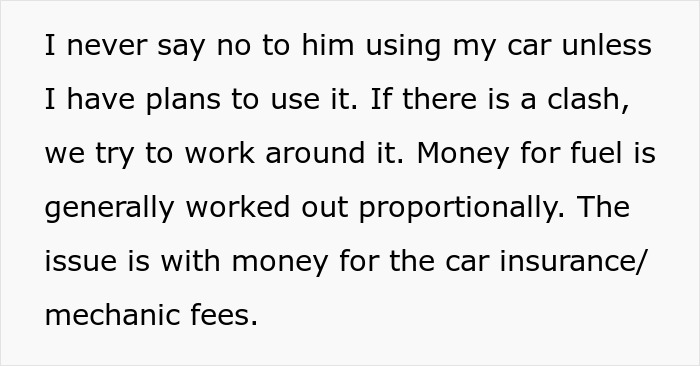“Unraveled Trust: Wife’s Fury as Husband Stands Firm on Car Expenses, Sparking a Marriage Crisis!”
The husband argued that since it’s technically his wife’s car, paying half would be unfair to him
Image credits: Hoverstock (not the actual photo)
Image credits: Even_Big3694
When there’s only one car, couples can have a sort of co-sharing agreement
Every family splits finances differently. For some, the husband being such a stickler might be strange, but if the couple has an agreement about how they allocate their finances and it works for them, who are other people to judge?
If the couple would like to be really particular, experts have suggested ways to split car costs when you’re sharing it with someone else. Attorney Janelle Orsi suggests three possible plans: a fixed monthly fee or a fee based on mileage, calculating expenses at the end of each month, or using a combination of these two methods.
Charging for mileage doesn’t just mean fuel costs. One way to calculate an accurate mileage fee is to find out annual car expenses. When you know the fuel, maintenance, and other variable costs, divide them by the combined miles the husband and wife drive.
If you don’t like calculating by mileage, the second solution might be for you. The couple splits overhead costs like insurance, registration, roadside assistance and others, equally. The co-sharer should also contribute to the monthly loan payments. While it’s not fair to ask them to pay off the principal, you can ask for an appropriate amount while taking into consideration the car’s depreciation.
How would you do that, you ask? Just look up a car of the same model but a year older, and check out how much it costs. The difference between how much your car costs and how much the other one costs should be the value of your car’s depreciation.
If you bought your car for $15k and the one that’s one year older costs $9.8k with 15,000 more miles, that means your car will depreciate around $1.2k a year. That’s $100 a month, so your co-sharer should contribute $50 each month.
Maintenance and repairs are other factors you should consider. Orsi writes that it might not be fair to expect a co-sharer to cover such expensive repairs as brake, transmission, or timing belt replacements. She recommends discussing how much the co-sharer would be comfortable contributing so that both of you feel it’s fair.
The fairest way to split finances is for both partners to contribute proportionally to their earnings
We tend to think of romantic partnerships as arrangements where both parties are equal. Both spouses should take on their part of the household chores, both should show each other respect, and both should contribute to financial security.
But is it fair to share finances 50/50 when you’re in a marriage? While that may sound like the fairest solution (it’s certainly the easiest one), it can actually be a burden for the partner who earns less than the other. Or, in this case, when one spouse uses an asset just as much as the other, but refuses to pay for its upkeep 50/50?
In this case, the wife makes less than her husband: he earns around £45k a year, while she makes £30k. In such situations, financial experts advise splitting costs proportionately. As the husband earns more, he should cover more of the household expenses and bills.





























